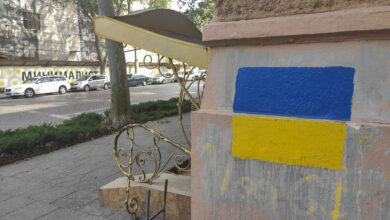Ukrainian bomb squad: overwhelming work with meager means

Kharkiv, Ukraine, Jul 8 (EFE).- Ukrainian bomb squads neutralize, on average, more than a thousand explosive devices every day. The enormous Russian arsenal turns their work into an inexhaustible task that they face with courage, but with few means.
Mikhail is part of a team of four bomb squads that deactivates war artifacts found by the residents of Kharkov, which, until the start of the war, was the second most populous city in the country with 1.4 million inhabitants, is also one of the most damaged by the war.
The most devastated area of the city is the north – closest to the Russian border, which is about 35 kilometers away – where explosives still undetected from the bombings of recent months are accumulated with those that continue to be launched now, although in smaller numbers.
In some cases they are inert remains, in others they carry an explosive charge that must be handled with care, explains the 27-year-old police officer, with five years of experience as a bomb disposal officer. In no case should civilians touch these artifacts.
“Sometimes we have stressful situations, when we get to some places where we know there is danger. We are human. But it is our job and we have to do it,” he said.
In and around Kharkiv, three bomb squads have been killed since the start of the war and seven others have been wounded. In the city there are more than 50 agents specialized in neutralizing explosives, but only half of them have experience. The others are rookies.
According to the State Emergency Service, more than 152,000 explosives, including nearly 2,000 aerial bombs, have been defused across Ukraine since the beginning of the Russian invasion on Feb. 24.
The morning begins with a call from a resident of the Saltivka neighborhood who has found ammunition and the remains of exploded rockets.
The Soviet apartment blocks of Saltivka housed 500,000 people before the war and was one of the largest neighborhoods in Europe. Now it stands almost empty in the middle of an apocalyptic landscape, with bomb-blackened buildings, crumbling facades and shattered glass.
Most of the work is concentrated in parts of that neighborhood, where some people still live in the least damaged apartments. One of her neighbors, Nina, has discovered a projectile in the attic of the building where she lives.
“They call us brothers and throw bombs at us. Does anyone understand what they are doing?” says this 77-year-old woman who has lived in the neighborhood for more than half a century and has no other place to go.
“Every night at ten o’clock they start shelling and it’s terrifying. Sometimes we think we’ve gotten used to it because we’ve been like this for months but it’s always terrible,” she added.
When the police officers left, Nina began crying and repeated: “How long is this going to last?”
The neighborhood – for the moment – is out of reach of the Russian artillery but in case of advance it would be one of the most exposed sites. The area itself is within range of missiles and rockets, which hit some areas at dawn.
The next stop is a private house where an explosive device launched with a small parachute has been found. They must carefully remove it with a shovel because, in addition, it contains some type of corrosive. EFE
ll/lds





